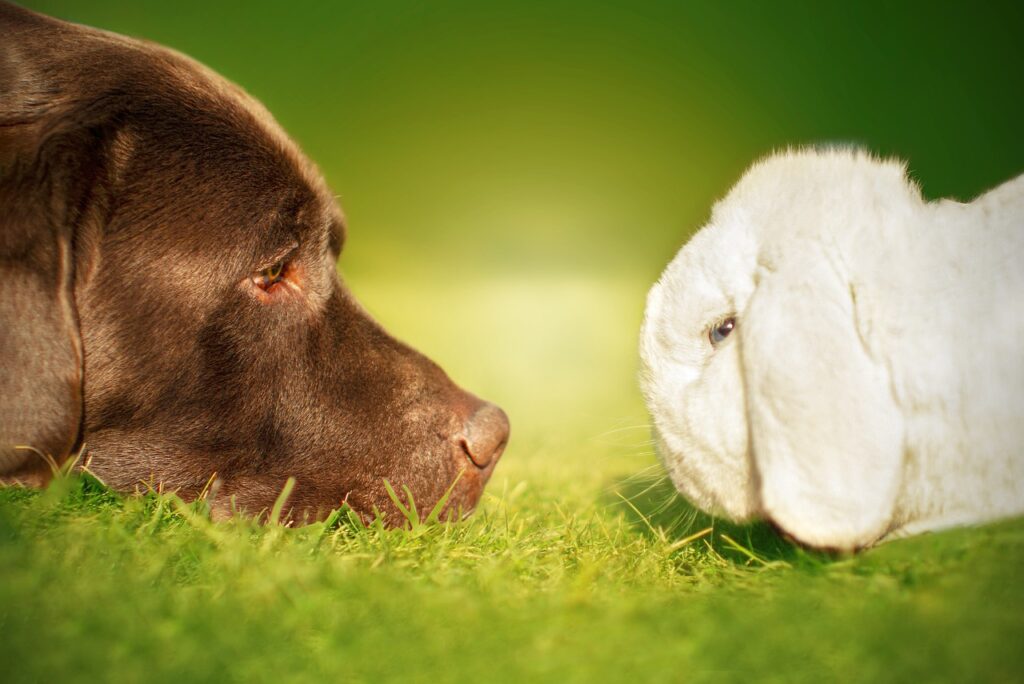A hound chasing a hare is a classic image, but what happens when a domestic dog encounters a bunny in the wild? Do dogs kill rabbits, or is their fluffy fascination simply a chase?
Let’s unravel the complex tapestry of canine instincts and their interactions with these petite creatures.
Key Takeaway
| Key Takeaways |
|---|
| 1. Dogs have innate hunting instincts which can be triggered by small animals like rabbits. |
| 2. Certain breeds with a strong hunting lineage (Terriers, Dachshunds, Beagles, Basset Hounds, Greyhounds, and Whippets) are more likely to chase and potentially harm rabbits. |
| 3. Not all dogs will kill rabbits; their behavior towards rabbits is influenced by their breed, individual personality, training, and experiences. |
| 4. Steps to prevent dogs from killing rabbits include understanding their instincts, early socialization, reinforcing basic commands, using a leash, distraction and diversion, implementing a “prey replacement”, rewarding good behavior, and consulting with a professional if needed. |
| 5. If a dog kills and eats a rabbit, it’s important to remain calm, remove any remains safely, check the dog for injuries, contact a veterinarian, monitor the dog’s health, consider ways to prevent future incidents and seek professional help if necessary. |
| 6. Dogs can potentially get sick from killing and/or eating a rabbit as rabbits can carry diseases and parasites like Tularemia, Rabies, and other parasites. |
| 7. Coexistence between dogs and rabbits in our shared environments is possible with understanding, training, and proactive measures. |
Understanding a Dog’s Hunting Instincts

Dogs, as descendants of wolves, have innate hunting instincts. These instincts can vary in strength depending on the breed of the dog and individual personality.
Historically, certain breeds were specifically developed to hunt. For instance, terriers were bred to hunt and kill vermin, while hounds were bred for their keen sense of smell and stamina to track game.
Sighthounds, like greyhounds and whippets, were bred for their speed to chase and catch game. The hunting behavior in these breeds is often more prevalent due to their genetic predisposition.
Hunting instincts in dogs involves a sequence of behaviors including searching, stalking, chasing, catching, biting, killing, and finally consuming.
When dogs encounter rabbits, their hunting instincts can be triggered. The quick movement of a rabbit can initiate the dog’s instinct to chase, even if the dog is generally well-behaved and non-aggressive.
It’s important to note that while dogs have these instincts, their expression can be modulated by other factors such as training, socialization, and the dog’s individual personality and experiences. For instance, a dog that has been well-socialized with smaller animals from a young age may be less likely to view a rabbit as prey.
Understanding your dog’s hunting instincts is key to managing their behavior around smaller animals like rabbits. It’s always important to ensure the safety of all animals involved and to follow local laws regarding wildlife.
Do Dogs Kill Rabbits?

Yes, some dogs may kill rabbits, particularly breeds with strong hunting instincts. This includes breeds like Terriers (known for hunting vermin), Dachshunds (originally bred to hunt badgers and other burrow-dwelling animals), Beagles, Basset Hounds, and other scent hounds (bred for tracking), and sight hounds such as Greyhounds and Whippets (bred for speed to chase down game).
Dogs are descendants of wolves and naturally have predatory instincts that can be triggered by the quick movement of small animals like rabbits. Certain breeds with a strong hunting lineage are more likely to chase and potentially harm rabbits.
However, not all dogs will kill rabbits. Many factors influence a dog’s behavior towards rabbits, including its breed, individual personality, training, and experiences.
For example, a dog that has been well-socialized with smaller animals from a young age may be less likely to view a rabbit as prey. Additionally, trained dogs can learn to control their impulses and behave appropriately around small animals.
It’s important for dog owners to manage their pets’ interactions with wildlife to ensure the safety of all animals involved. If a dog has access to areas where rabbits live, the owner should take steps to prevent harm, such as keeping the dog on a leash or using fences to separate the animals.
How Do I Stop My Dog From Killing Rabbits?
Step 1: Understand Your Dog’s Instincts
Recognize that chasing and hunting are instinctual behaviors for dogs. Understanding this can help inform your approach to training and managing your dog’s behavior.
Step 2: Early Socialization
If possible, expose your dog to smaller animals at a young age in a controlled and safe environment. This can help them learn to see these animals as friends, not prey.
Step 3: Reinforce Basic Commands
Train your dog to understand and follow basic commands like “leave it,” “come,” and “stay.” Consistently reinforce these commands in various situations so that your dog is likely to obey even when distracted.
Step 4: Use a Leash or Long Line
When you’re in an area where rabbits are common, keep your dog on a leash or long line. This gives you control if your dog tries to chase a rabbit.
Step 5: Distraction and Diversion
If a rabbit appears, try to distract your dog before they start to chase. This could involve using a favorite toy, or treat, or initiating a command.
Step 6: Implement a “Prey Replacement”
Use toys to simulate a chase, allowing your dog to exercise their hunting instincts in a controlled way. This can reduce their need to chase live animals.
Step 7: Reward Good Behavior
Always reward your dog for positive behavior. If they obey a command instead of chasing a rabbit, give them lots of praise, a treat, or playtime.
Step 8: Consult with a Professional
If your dog continues to chase or harm rabbits despite your efforts, consider consulting with a professional dog trainer or animal behaviorist. They can provide targeted strategies and techniques to address your dog’s specific behavior.
What To Do if Your Dog Kills and Eats a Rabbit?
Step 1: Don’t Panic
Your initial reaction might be shock or distress, but remember that your dog is acting on its natural instincts. Don’t punish your dog as it likely won’t understand why it’s being punished.
Step 2: Remove Any Remains Safely
If there are any remains of the rabbit, remove and dispose of them safely to avoid further engagement or potential for disease or parasites.
Step 3: Check Your Dog for Injuries
Rabbits may fight back when attacked, so check your dog for any injuries. If you find any wounds, consult with your vet.
Step 4: Contact Your Veterinarian
Even if your dog seems fine, contact your veterinarian. Rabbits can carry diseases that could be harmful to your dog if consumed. Your vet can advise on any necessary steps or precautions to take.
Step 5: Monitor Your Dog’s Health
Watch your dog closely over the next few days for any signs of illness, such as vomiting, diarrhea, loss of appetite, or unusual behavior. If you notice anything concerning, contact your vet immediately.
Step 6: Prevent Future Incidents
Consider ways to prevent such incidents in the future. This could include securing your yard to keep rabbits out, keeping your dog on a leash or supervised when outside, or providing additional training to discourage chasing and hunting behavior.
Step 7: Seek Professional Help
If your dog repeatedly kills wildlife and you’re struggling to manage its behavior, consult with a professional dog trainer or animal behaviorist. They can provide guidance and strategies to help manage your dog’s hunting instincts in a safe and effective way.
Can a Dog Get Sick From Killing a Rabbit?
Yes, a dog can potentially get sick from killing and/or eating a rabbit. Rabbits can be carriers of various diseases and parasites that can be harmful to dogs. Here are a few examples:
- Tularemia: Also known as “rabbit fever,” tularemia is a bacterial disease that can be transmitted to dogs if they handle or ingest an infected rabbit. This can cause fever, reduced appetite, and lethargy in dogs, and in severe cases, it can be fatal.
- Rabies: Though less common in rabbits than in some other wild animals, rabies can potentially be a risk if it’s prevalent in your local area.
- Parasites: Rabbits can be hosts to a variety of parasites, such as ticks, fleas, and internal parasites like tapeworms. These can be passed to dogs and cause various health issues.
If your dog has killed and eaten a rabbit, it’s advisable to consult with a veterinarian, even if your dog appears healthy. The vet can recommend any necessary treatments or precautions to ensure your dog remains healthy.
In Conclusion
From the primal pulse of the chase to the quiet curiosity of a sniff, dogs, and rabbits share an intricate dance in nature.
As we’ve discovered, while some dogs might kill rabbits, many factors influence this behavior, offering pathways for coexistence in our shared environments.


Leave a Reply